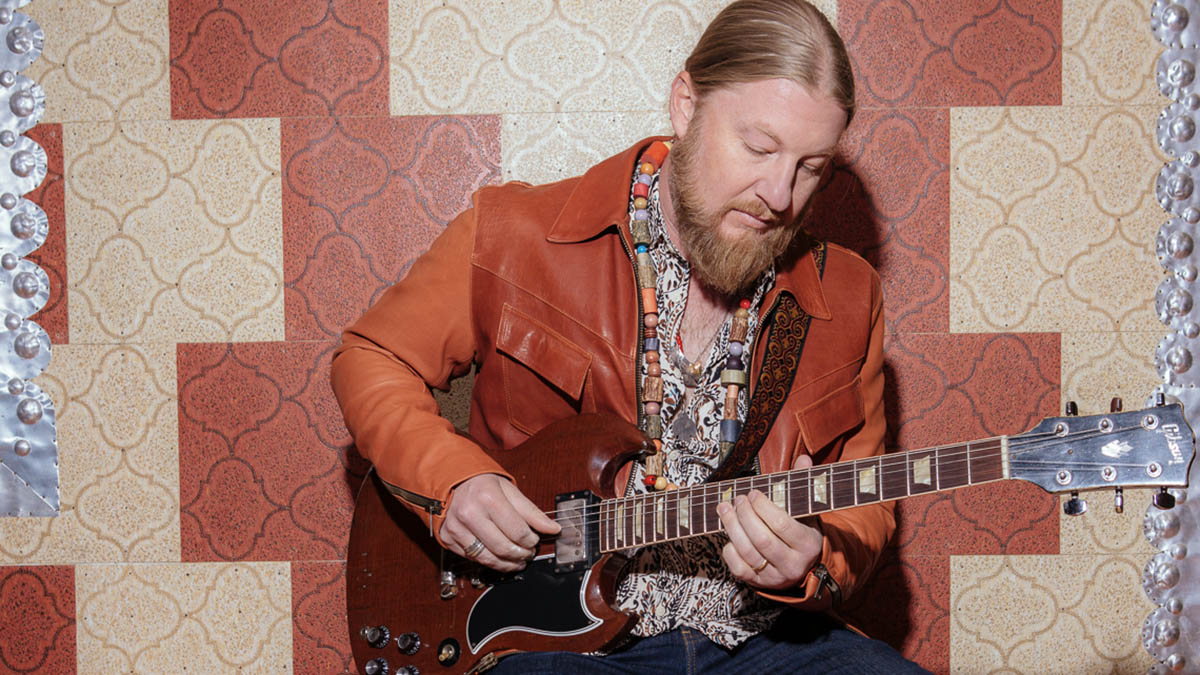Susan Tedeschi of Tedeschi Trucks Band: “Derek is one of the best guitar players in the world and for me to be in a band with him is kinda surreal”
Susan Tedeschi on her guitar dynamics with Derek Trucks, the Tedeschi Trucks Band's gift for improv, and the eternal poetry behind their breathtaking quadruple album I Am The Moon
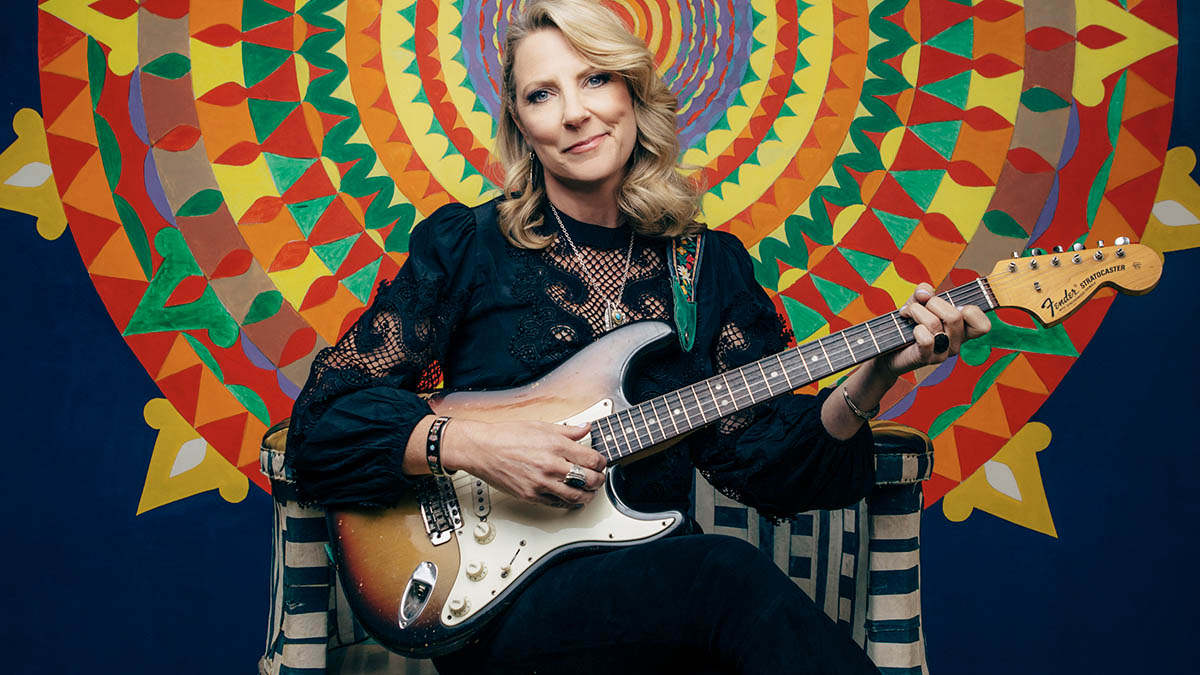
No one makes records like I Am The Moon anymore, that is, if any one ever did. The Tedeschi Trucks Band’s latest studio release is a quadruple album, conceptually orbiting 12th-century Persian poet Nizami Ganjavi’s Layla And Majnun, which will be released in four chapters, each accompanied by companion films directed by Alix Lambert.
The first of which, Crescent, is with us now, and it is a typically audacious, stylistically dynamic work from the 12-strong ensemble fronted by husband-and-wife guitar duo Susan Tedeschi and Derek Trucks.
It opens to the southern soul of Hear My Dear, Truck’s glass slide turning the electric guitar to something liquid, spilling over Gabe Dixon’s keys before Tedeschi’s peerless vocal comes in. It sets the table for what’s to follow.
I Am The Moon is the sort of epic project that could only have been undertaken in the ‘70s. And yet here we are, the Tedeschi Trucks Band reinterpreting Nizami for a 21st-century audience on the grandest scale.
TTB has had previous with Nizami, albeit at a remove. In 2019, they performed Derek and the Dominos era-defining Layla And Other Assorted Love Songs at LOCKN’, later releasing the set as a live album with Trucks and Tedeschi adding a studio-recorded duet of Thorn Tree In The Garden to close things out.
Layla, the object of desire, the name behind Eric Clapton’s riff, was the Layla immortalised in the Nizami’s Layla And Majnun. But a good few months had gone by before anyone in the Tedeschi Trucks Band thought of returning to the material that had similarly inspired Clapton and Jim Gordon when they wrote Layla back in 1970.
It was vocalist Mike Mattison who asked the question: what if they approached Layla And Majnun from Layla’s point of view? That got everyone started. Tedeschi says Mattison set them some homework: revisit the poem, see what comes up.
Get the MusicRadar Newsletter
Want all the hottest music and gear news, reviews, deals, features and more, direct to your inbox? Sign up here.
We could look at that poem and see a lot of parallels. Here is Layla, locked away in a tower, isolated, from her family and her lover, and it’s like, ‘Oh my gosh! Everybody is locked in their own little towers
When we spoke to Derek Trucks about the LOCKN’ show and Layla Revisited, we talked about blues standards and how they were eternal, waiting to be discovered anew, the same could be said of Layla And Majnun. As it turned out, in 2020, everyone could relate to Layla – everyone was locked down.
“Absolutely, we could look at that poem and see a lot of parallels,” says Susan Tedeschi, joining us over Zoom. “Here is Layla, locked away in a tower, isolated, from her family and her lover, and it’s like, ‘Oh my gosh! Everybody is locked in their own little towers. And then the mental health deteriorates because people need each other.”
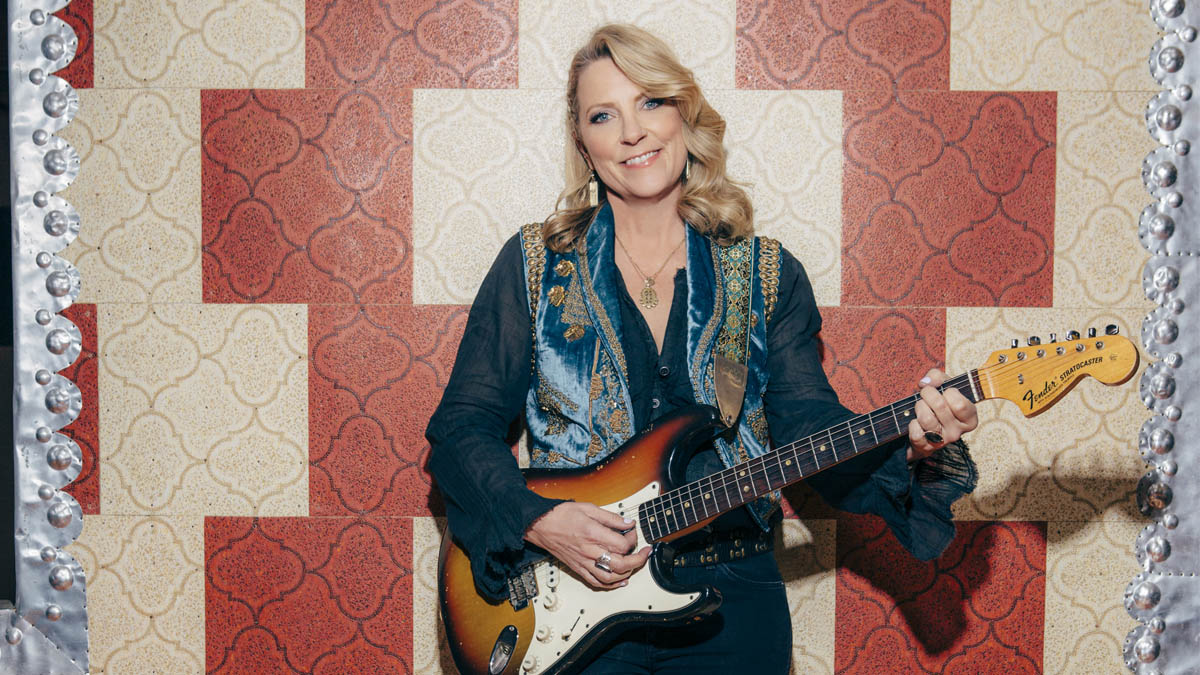
“How many people kind of went insane during this lockdown? A lot of people! If you were lucky enough to live through it,” she continues. “Human touch, getting to hug and kiss your family, your parents... If you are away from your children or whatever, it made you realise how much we need each other.
When Gabe wrote the song I Am The Moon I was like, ‘How do you know woman so well?’ Literally, that song got me through the pandemic
“People just go insane without each other, they really do, so there were a lot of parallels with the real world, as well as relationship things that you can totally relate to on many different levels. There were a lot of things to dive into.”
And that, explains Tedeschi, made for a lot of music, opportunities for the band to stretch out, to explore the various influences that are brought to bear on their sound, and to make something bigger.
Then you end up with over 20 songs and a decision to make: how do you release them all?
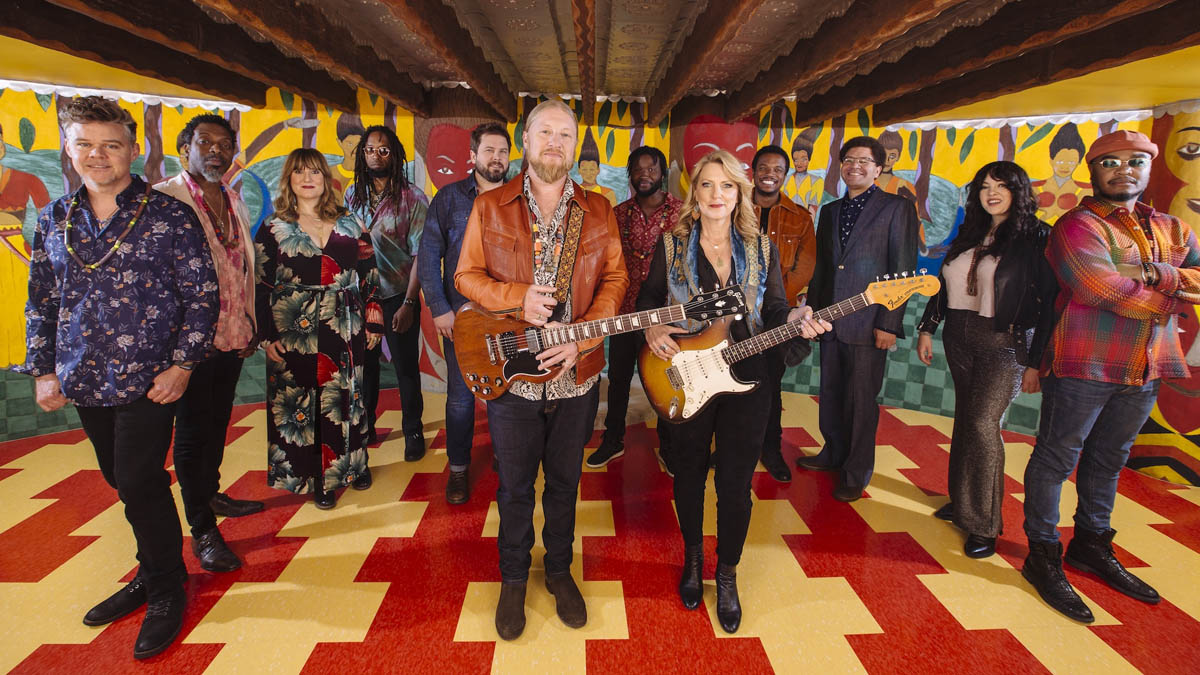
No one makes quadruple albums. It’s something that seems like it could only have been made in the ‘70s. How did you decide to release this as four chapters?
“People don’t have huge attention spans anymore. The great thing about some of your favourite records – like Axis: Bold As Love – is a lot of great records are like 34 minutes, so that ended up being part of the conversation after we had made all of this music.
“We really didn’t want to cut anything because there were so many great songs. And so much diversity because there are so many songwriters in the band. Then we realised, ‘Oh, wow! We could make episodes, like The Mandalorian or something! [Laughs]
We really didn’t want to cut anything because there were so many great songs. Then we realised, ‘Oh, wow! We could make episodes, like The Mandalorian
“It was cool because all these different ideas happened and it all just came together, and everyone did a great job writing and recording. It just worked out where we had enough time to do it. We weren’t touring; this is a very busy touring band because that is just usually the way we can afford to keep a 12-piece touring band together, to work.
“It kept everyone focused. Even though we weren’t together we were together, like you and I right now, at least we can see each other and communicate, and that is just so important. It ended up being really fun, and a really cool concept record. It’s cool that you said it was like total ‘70s pop-style to do this! [Laughs] I think we are all very influenced by ‘70s music for sure.”
There are so many metaphors with this record. Even the title, in referencing the moon, it sets the rhythm for so much of our lives – the tides…
“Yeah, and it’s funny because when Gabe wrote the song I Am The Moon I was like, ‘How do you know woman so well?’ Literally, that song got me through the pandemic, on the first record, Crescent. It just absolutely hit home.
“I mean, women, even our cycles are really in-synch with the moon and the tides and all of this stuff, literally, our bodies work off of it! [Laughs] And we’re emotional creatures. We are made of water. It’s just really amazing how it ties in.”
There is almost a sci-fi quality to some of the record, not least because of the moon but the arrangements themselves have this sense of travel to them. Is that something you see?
“No, I don’t know that I actually did but now that you say that I can see that. Absolutely. Yeah.”
Well, to be specific, Circles ‘Round The Sun has this ‘70s afro-futurist jazz feel to it, Miles Davis, Sun Ra…
“Falcon, who wrote that song – Tyler Greenwell, our drummer – really wanted it to be as ‘out’ as possible, just make it be psychedelic, and really go to another stratosphere. So yes, he was thinking that way with the song. But also being very down to earth too.
"It is also the imagery of Majnun being in the desert, and going mad, and people are searching for him. He is lost, and they can’t find him, and he is just so delusional that reality is just not there. For sure, I thought he was trying to go ‘out’ with that, so you could say sci-fi for sure, yeah. I like that.”
There is a geographical phenomenon with your sound – it’s like you play on both sides of the Mason/Dixon Line. Like on Pasaquan, it switches on a dime and you end up deep with a sort of ‘70s Harlem vibe.
“Totally! [Laughs] Well, the personalities have a lot to do with it. There is a tremendous amount of chemistry in this band. A lot of bands, I don’t think they realise how important it is to have the right chemistry in the band, not just onstage but offstage.
“We go and eat food together. We go and do laundry together. We go to events. We’ll go to a museum. We’ll work out together. We are always doing something together. We are very close and tight-knit. But, musically, we have a lot of different influences and a lot of sensibilities that we have in common. One of those is the daringness to go out, to be improvisational, but also to have the confidence that these people are so musical they are not going to embarrass you.
With 12 people onstage, you would think that it would be all noise and loud all the time, and actually it is an incredibly dynamic band. You can bring it down to a pin drop
“They are going to take you to a higher place, and we all lift each other musically. We have that confidence in each other to do that, which a lot of bands, I don’t think they have that improv level that we do. Also, you can be the songwriter, and tell the story, then expand it out. And you can bring it back. You can do so many things with it.”
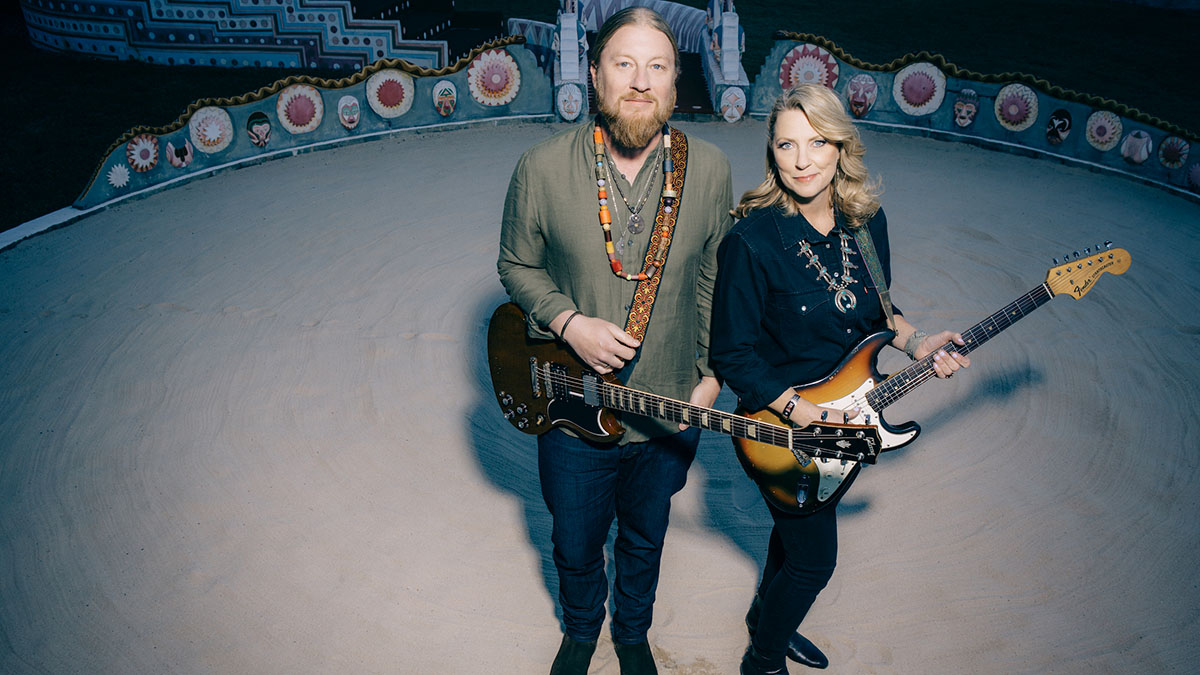
Sure, your sound can be big and it can be small. There is space to not play, and that is rare because it is hard to get such a large ensemble – not least one with that shared understanding.
“It really is, especially with 12 people onstage, you would think that it would be all noise and loud all the time, and actually it is an incredibly dynamic band. You can bring it down to a pin drop, and one person will be holding a note, and everybody is really listening, and in the moment, and if something changes we can get up and support it.
“It really can go anywhere. Especially with people like Derek or Kebbi [Williams, saxophone] improvising, or with Gabe on keyboards, like you were saying, things can really go anywhere at any time, and that is the great thing about it. You just don’t know what you are going to get. It is always new and creative and fun.
“And it is light and joyful. That is one thing that is also special about this band is that it brings people joy. We really try to have a positive message about bringing people together. This world is so divisive right now. Everybody, these big leaders are trying to tear everybody apart and, well, I’m sorry, that is not going to happen.
“Musicians and artists, they are going to stand together for community and you are going to bring people in and figure out what you have in common. And if you look at our band, all of us are from different races and cultures, and religions, but we have one thing in common; we are a family, together as a band. I think people see that and it really gives them hope, and they enjoy that.”
It’s about making something people can take what they need from it. It can be a Friday night and drinks with friends, or it can pick you when you are low.
“And that is the thing about this project, there are so many different songs that will relate to different people in different moments for different things. Like you said, you can draw on it what you need to get out of it. It leaves it up to the interpretation of the listener what it means to you.
“You can have a song that means one thing to one person and a completely different thing to another, but it can have the same kind of impact. It can really changes someone’s life or make them think, ‘Wow! I can do this. We can do this.’ It’s cool. I love how music can do that.”

How much of these songs are written and composed in advanced of you being together? It sounds like it is all in the room but that can be an illusion.
“It depends song by song. Some of them, maybe Mike wrote the song and had everything there, and then recorded it. Then maybe there’s six of us in a room and we’ll add the horns later, and the singers, because it is hard to get the whole 12-piece in there. You can’t really do that.
It is a beautiful thing when you are actually hearing the birth of the song. So, some songs were literally written on the floor when we were recording them
“There’s a song on one of the records called D’Gary, which was originally a really cool guitar thing that Derek had written, and interestingly enough we named it after D’Gary, this famous Madagascan guitar player. Derek’s part was originally like, Jolene, a Dolly Parton kind of a song, but it morphed.
“We were talking about [Haruki] Murakami at the time, who is this beautiful Japanese writer, and I was thinking about how he tells stories, and some of his imagery, and when we were recording D’Gary we didn’t have words. When we went in, I would be literally writing each verse as we would play it. We would play it, and I would write a verse. ‘Guys, play it again. I think I’ve got a second verse.’ Then we’d play it, add it on, and I would have the second verse.
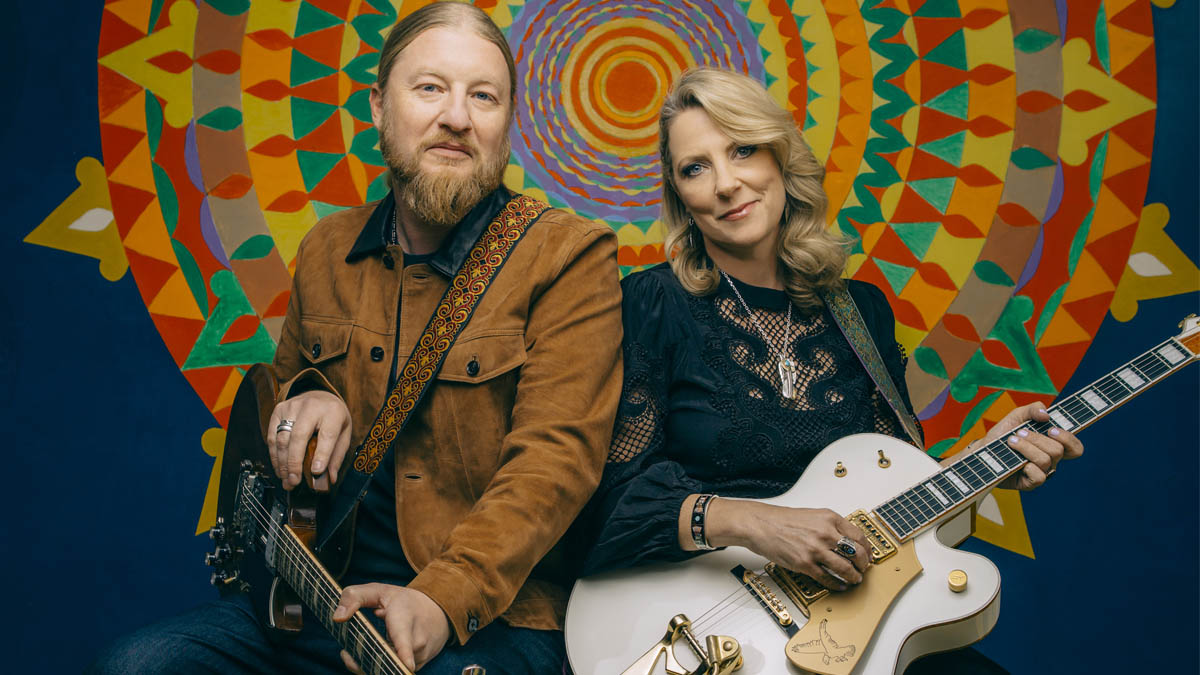
“On that one, I never even had to go in and re-sing it; I just didn’t think I would run out of time where I wouldn’t be able to go back and do it, but it is a beautiful thing when you are actually hearing the birth of the song.
“Some songs were literally written on the floor when we were recording them, and then other ones were maybe brought in and tweaked, arrangements got a little bit tighter as we recorded them. There was no one way of doing any of them, honestly.”
It’s fun to leave people guessing. People like the spontaneity of, ‘What are they gonna play tonight? And who’s gonna sit in!?’ It could be Santana or Clapton, you just don’t know
It is about 4 min 30 secs into Pasaquan where you switch things up, and it’s like the stargate sequence in 2001: A Space Odyssey, there is a transition that’s almost inter-dimensional. It is heavy, too. I Am The Moon is a heavy song.
“It is. It is very meaningful, and it’s deep, and it makes you realise how connected we are, not just to each other but to the planet, the solar system, and the world we are existing in and how it is all so very fragile. And how everything has to have balance, y’know.
“A song like Pasaquan, each day after we’d record, Derek would be like, ‘Hey guys, let’s just go in and do a pass at this and see what happens.’ And they would just jam for 10 to 15 minutes and then one day it really clicked and it’s like, okay, that’s the one. It is just in the moment. You don’t know what is going to move you at the time.”
Are there any plans to perform this in its entirety, filmed and released on DVD/Blu-ray?
“I don’t know… Maybe! Well, we are still working on conceptual ideas because you definitely could do that. You can definitely play all four albums on one night. First set could be the first two records. The next could be the following two records. But it’ll be interesting to see what we end up doing because as the summer progresses we will be adding more and more new music. That will be nice.
“We already have a good 75, 85 songs that we pull from on a night. We have a master list. Now we will have a good 100 songs. I am sure we will have some nights where we make it a point to play one of the records, if not everything in its entirety. Also, it’s fun to leave people guessing. People like the spontaneity of, ‘What are they gonna play tonight? And who’s gonna sit in!?’ I don’t know. It could be Santana or Clapton, you just don’t know.”
What about the gear on the record?
“When I play live, I use a Fender Super Reverb and I have Derek’s old, well, actually it’s Eric Clapton’s old Beano Les Paul copy that he gave to Derek that I play a lot. And then I have a ‘90s Tele. Derek always has his SG, and his SG is actually a copy of Duane Allman’s SG that he played. It’s funny, we have a Duane and an Eric guitar, and we play them together a lot which is kinda cool.
“We played a lot of different guitars on this record, acoustics and electrics, and different amps. I definitely played through a little Deluxe Reverb on a lot of this. I thought that I was going to go in and replay my solos and stuff but just didn’t get to it, so it is what it is, live on the floor! [Laughs]
“But it was fun and it was great, and honestly, live, these songs are going to develop more because they were just being birthed while we were taping them. They were gorgeous then but I think they are going to be even better live… Unless it’s maybe really psychedelic with a lot of layers on it, but then we can recreate a lot of that stuff live, too.”
Your Les Paul is a real flamethrower; it is so powerful, especially when you’ve got the wah on.
“That guitar is a beast. I’ll tell you right now, that thing has got a life of its own. When we were out touring with Hot Tuna, with Jorma Kaukonen from Jefferson Airplane, he was like, ‘Where did you get that? I want one of those!’ And he went out and bought one because he was inspired by the Beano. It’s basically a Custom Shop version of Clapton’s Les Paul. And it’s heavy.
“Derek plays his SG and it’s all nice and light, and he has the double-cutaway so he has all that room to play. I don’t know why I make it so difficult for myself. I mean, I am already not the guitar player Derek is on top of it but it is harder to play, it’s heavier, but it has such great tone and it just has balls. It’s like… AC/DC or something! [Laughs]”
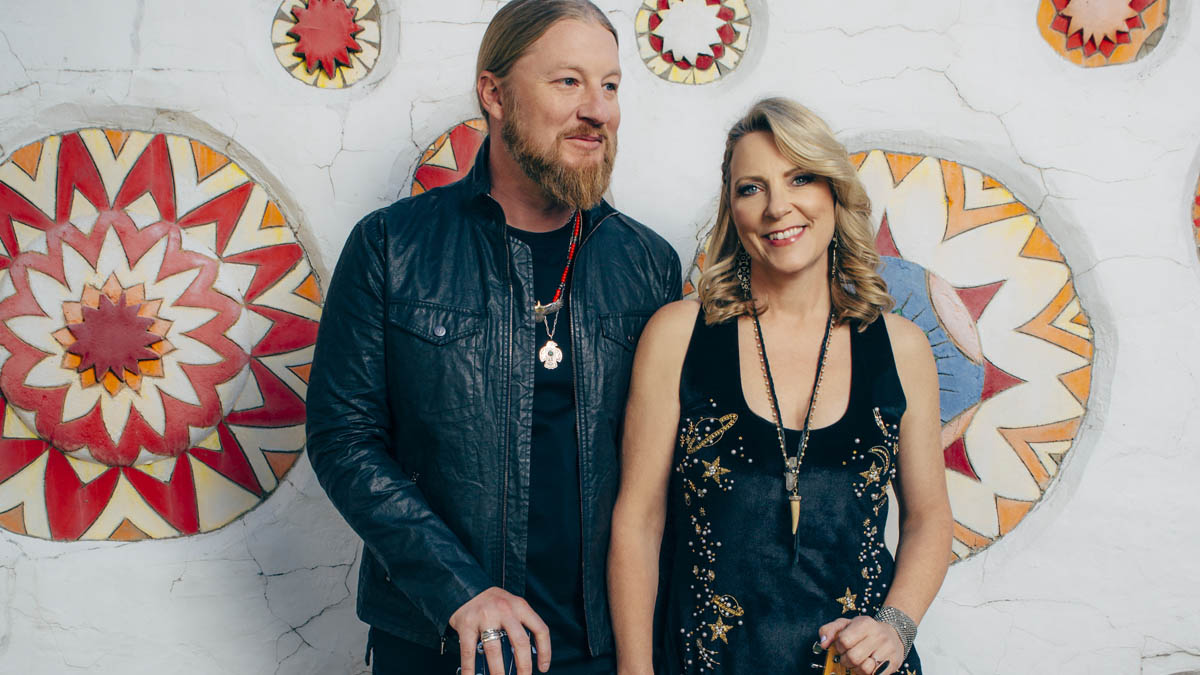
How do you work out how those guitar parts will sit where in the mix?
“When we are recording, Derek is producing the record, and he mixes it along with Bobby [Tis], so if it feels like he need to push those solos to make them really sing then he will do that. But in the past he hasn’t done that so much so it’s nice for him to take that liberty with this record, particularly on songs like Pasaquan, where you can really just make it the forward voice.
Sometimes Derek is tucked away in those pretty lines, and they’re really beautiful, and other times it’s like a big ol’ semi truck coming at you.
“He really is so gifted as a guitarist that he needs to be shown off in that way. It can’t all just be singer-songwriter songs. It can’t all just be the song – it has to be about the artist, too, because he is so creative. Like you were saying, a Miles Davis, he is going outside the box and he is pushing himself.
“Not everybody can do that, and not just do it but do it with grace, and fluidity, and with perfect intonation, and to go places rhythmically with the band, to push the drummer, to push the bass player, and it’s really cool that we can show that on these records.
“Sometimes he is tucked away in those pretty lines, and they’re really beautiful, and other times it’s like a big ol’ semi truck coming at you. Like, ‘Oh my gosh!’ It’s nice to have the opportunity for him to pick and choose where that happens.”
He picks his notes so well. You both do. As guitar players, we all love the instrument but sometimes too much and we let the fingers take over. It’s recognising the need to be a team player.
“It is, and it’s really nice that Derek gives me moments because honestly he doesn’t have to. He is one of the best guitar players in the world and for me to be in a band with him is kinda surreal. He’ll be like, ‘Play it!’ I’ll be like, ‘Me!?’
“I’ll be intimidated at first but then I’ll go, ‘Yes, I’m gonna do this! And not just for me but for all the girls out there! Girls, we can do it!’ Because it is such a guy’s world and it is nice to see all these young girls out there playing guitar and ripping it, like really good. It’s big change.”
- I Am The Moon: 1. Crescent is out now via Fantasy. Its follow-up, Ascension, is available to preorder and is out 1 July 2022.
Jonathan Horsley has been writing about guitars and guitar culture since 2005, playing them since 1990, and regularly contributes to MusicRadar, Total Guitar and Guitar World. He uses Jazz III nylon picks, 10s during the week, 9s at the weekend, and shamefully still struggles with rhythm figure one of Van Halen’s Panama.
"Reggae is more freeform than the blues. But more important, reggae is for everyone": Bob Marley and the Wailers' Catch a Fire, track-by-track
“Part of a beautiful American tradition”: A music theory expert explains the country roots of Beyoncé’s Texas Hold ‘Em, and why it also owes a debt to the blues
